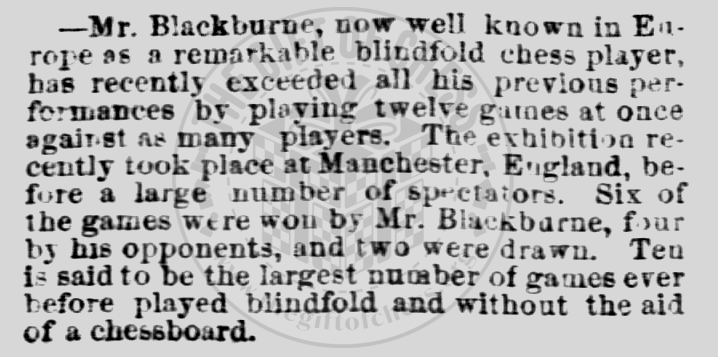January 12 1863
The Courier and Argus, Dundee, Tayside, Scotland, Monday, January 12, 1863
Chess Intelligence.
The match between Mr. Blackburne, the eminent English blindfold players, and Herr Steinitz, of Vienna, has just terminated in favor of the latter—the final result being:—Steinitz, 7; Blackburne 1; drawn 3.
June 24 1863
The Coventry Times, and Warwickshire Journal, Coventry, West Midlands, England, Wednesday, June 24, 1863
Blindfold Chess—Mr. J. H. Blackburne, the talented blindfold chess player, has returned to Manchester, after a visit to London and several eminent provincial clubs, and on Saturday gave an exhibition of his wonderful powers, conducting on this occasion twelve games, without sight of boards or men. Stewart's Telegraph Dining Rooms were placed at his disposal by the kindness of the proprietor. The rooms were visited during the evening by many admirers of the game. Quietly seated in a corner, gazing on a blank wall Mr. Blackburne conducted the twelve games with astonishing accuracy. Many of the moves involved intricate combinations, Mr. Blackburne having to calculate the result of five or six following moves as well as to remember all previously made at that board, although he had been mentally absent from it upwards of an hour. It is believed that this is the first time twelve blindfold chess games have ever been played. The games commenced soon after three, and were continued until after eleven o'clock, at which time the score stood as follows:—Blackburne wins five, loses two, and unfinished five. As an illustration of the clearness of Mr. Blackburne's play, the following incident may be recorded:—A piece having accidentally got misplaced on one board, he detected the error at once, and to prove that he was right, repeated from memory, with great rapidity, the 36 moves made previously.
June 28 1863
The Era, London, Greater London, England, Sunday, June 28, 1863
Blindfold Chess.— Mr. J. Blackburne gave an exhibition of his blindfold play on Saturday, the 20th instant, at Manchester, playing twelve games without seeing the boards. Stewart's Telegraph Dining Hall, the scene of this extraordinary exhibition, was thronged by a large assemblage of the admirers of the game. Quietly seated in a corner gazing on a blank wall, Mr. Blackburne conducted the games with extraordinary accuracy. Many of the moves involved intricate combinations, Mr. Blackburne having to calculate tho result of five or six successive moves, as well as to remember all the moves previously made. The play commenced at three o'clock, and was continued until after eleven. It was again continued on Monday, and the final result was that Mr. Blackburne won six games, lost four, and drew two. This, we believe, is the first time that so many as twelve games have been played blindfold and simultaneously in Europe. The following incident is recorded as an illustration of the clearness of Mr. Blackburne's play: A piece having accidentally got misplaced on the board, he detected the error at once, and to prove that he was right, repeated from memory, with great rapidity, the thirty-six moves made previously.
July 24 1863
Chicago Tribune, Chicago, Illinois, Friday, July 24, 1863
Mr. Blackburne, now well known in Europe as a remarkable blindfold chess player, has recently exceeded all his previous performances by playing twelve games at once against as many players. The exhibition recently took place at Manchester, England, before a large number of spectators. Six of the games were won by Mr. Blackburne, four by his opponents, and two were drawn. Ten is said to be the largest number of games ever before played blindfold and without the aid of a chessboard.


























